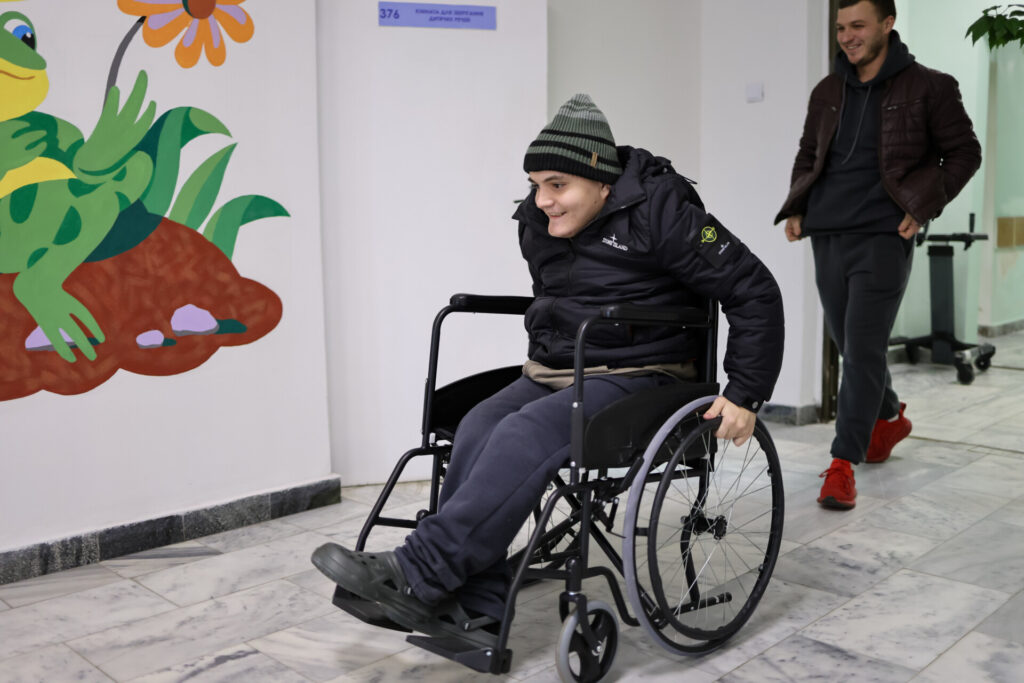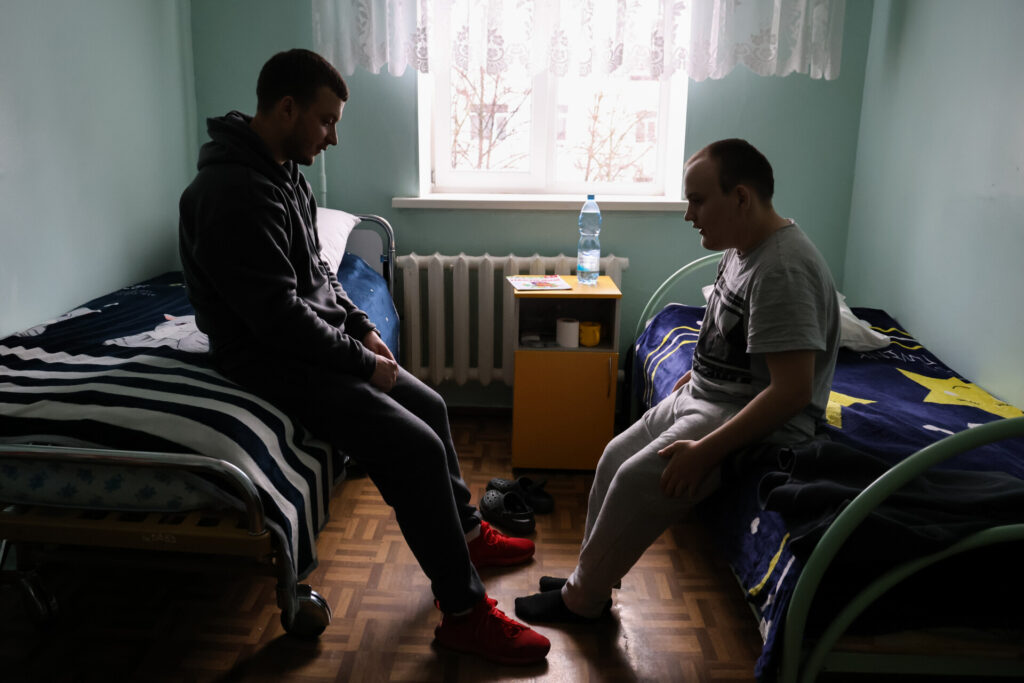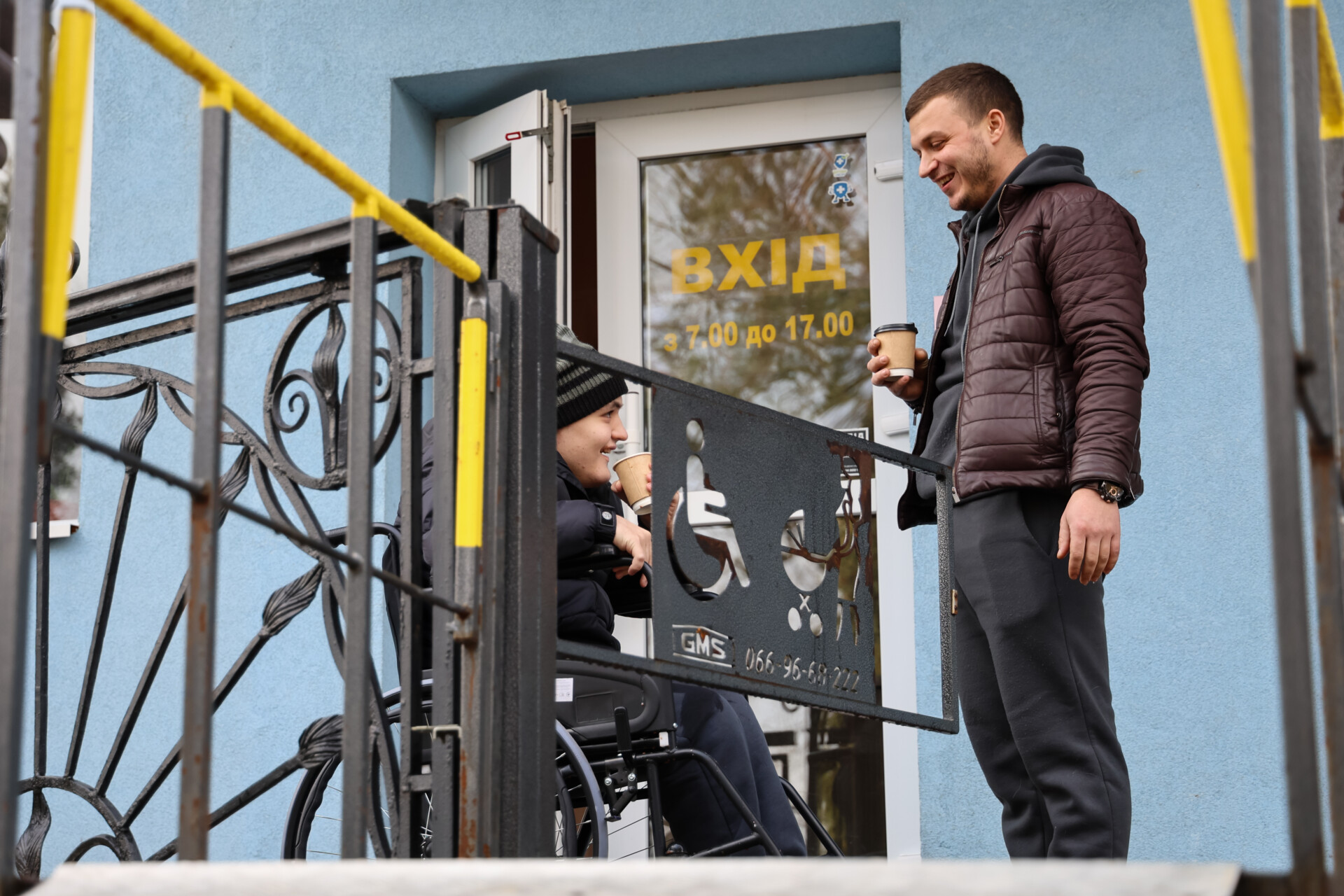The journey had been arduous. It took over three days for the disabled teenager to make it back to his family at the end of last year. “I’m going to Kyiv, I’m going to Kyiv,” Heorhiy Burskyi excitedly said, his words on repeat. He carried with him photographs of Kyiv’s Independence Square, printed by Ukrainian nurses at his request.
But the time on the road paled in comparison to the two and a half years that Burskyi, affectionately known as Gosha, spent under Russian control after he was forcibly removed from his specialist boarding school in Ukraine, a transfer deemed illegal under international law.
His older brother, Petro Yenyushin, has fought tirelessly for Gosha’s return from Russian captivity, a task that initially seemed impossible — he didn’t know his younger brother’s precise whereabouts and had no way to contact him.
Just over a month after New Lines and The Reckoning Project published an investigation into Moscow’s targeting and deporting of disabled children from Ukraine, including Gosha, he was found and returned to his family. In late November, Yenyushin traveled to meet him in the Belarusian capital of Minsk, where Gosha was among eight Ukrainian children being returned by the Russian state, the youngest of whom was just 6 years old.
The reunion had been long in the making: After the facility where Gosha lived came under Russian control, he was forcibly moved to another occupied region. To reach his brother, he spent days traversing thousands of miles, from Russian-occupied Ukraine to Moscow before heading west to Minsk.
“When Gosha arrived at the hotel, he looked exhausted but happy,” said 31-year-old Yenyushin, who gained full custody of Gosha, who is now 16, in June last year.
Despite nearly three years apart, Gosha instantly recognized his brother. The two immediately returned to their old ways, cheerfully joking with each other.
Most likely to the chagrin of Moscow, Gosha also seems to have developed a taste for patriotism from his time in Russian custody. When they were in Belarus, Gosha was given a package of sweets for St. Nicholas Day in December. The teenager was confused, mistaking them for Russian candy. “He told me, ‘These are Russian, I’m not going to eat them,’” Yenyushin said. “It’s likely in Russia the sweets were given as a reward for certain statements made to the press,” he added.
Reaching Belarus was tricky for Yenyushin: Its leader, Alexander Lukashenko, is a staunch ally of Russian President Vladimir Putin, and human rights activists have repeatedly documented how the country has aided the Kremlin’s systematic deportation of Ukrainian children. Moscow chose Belarus as supposedly neutral territory for the return of the children, even though it is not impartial.
The two then traveled from Minsk to Ukraine, a journey of 10 hours.
“Some of the [returned children] have health issues and were met in Ukraine by medical teams with ambulances,” Ukraine’s human rights ombudsperson Dmytro Lubinets wrote on his Telegram channel.
Once across the border, Gosha was taken to the Cherkasy Regional Children’s Hospital in the center of Ukraine, where he underwent a week of examinations. He had gained weight in Russian custody but was his usual jolly self, basking in the attention from the medical staff. He is now staying at the regional children’s hospital in Kyiv.
Yenyushin has kitted out his home for his younger brother’s return and purchased a wheelchair and walker. He is in the process of preparing Ukrainian documents for him.

The brothers last saw each other in the winter of 2022 in Kyiv, shortly before Russia’s full-scale invasion of its southern neighbor. After the February onslaught, Gosha managed to call Yenyushin a few times from the Oleshky facility, named after the small city in the Kherson region in which it is located. But by April of 2022, he couldn’t get through. In the fall of that year, Gosha and scores of other disabled residents at Oleshky were forcibly moved to Russia, the occupied Ukrainian region of Crimea and the Black Sea city of Skadovsk. Gosha ended up on the Crimean Peninsula, which was illegally annexed by Russia in 2014.
It was critically important for Yenyushin to bring his brother home. Gosha has infantile cerebral palsy and a rare form of bone atrophy that requires him to use a wheelchair or walker, with round-the-clock, high-quality medical care. He received that at Oleshky, one of the country’s best facilities for people with mental and physical disabilities. Yenyushin and Gosha’s carers didn’t know what kind of support, if any, the Russians were providing. They did know that the disabled children were being exploited by Russian propaganda to portray them as supporters of Russian aggression.
In early 2024, a year and a half after the Russians deported the residents of the Oleshky school, a video surfaced of a Russian soldier thanking Ukrainian children for their support. The camouflage-clad soldier held up a drawing that he said two children from Oleshky made for the Russian army. He identified one of them as Gosha.
The portrayal of a child creating drawings in favor of the Russian military sits oddly with the teenage Gosha, who insisted on having photographs of Kyiv’s iconic central square in his pocket while he traveled to safety.
For the Russians, the deportation of disabled people was a propaganda opportunity, to show off their munificence. Yet in reality, the disabled residents of Oleshky were being held in poor conditions. The center in Skadovsk, to which Gosha was later transferred, was a two-story building that lacked the necessary equipment to adequately cater to the Oleshky children’s special needs. “Gosha told me that sometimes they even put straitjackets on the children there,” Yenyushyin said, adding that Gosha told him that while he wasn’t mistreated, others were.
In November, the British government sanctioned the Ukrainian Vitalii Suk, a local driving school teacher who had sided with the Russians early in the occupation. Suk was appointed by the Russians to run the Oleshky facility under their occupation. According to data we obtained from the prosecutor general of Ukraine, Suk signed the list for the “evacuation” of 16 of the children to Crimea. In its statement in November last year, the British Foreign, Commonwealth and Development office said Suk “has also been sanctioned for using his position to illegally transfer disabled Ukrainian children out of Kherson.”
In wartime, the most vulnerable are often sidelined or even forgotten. But international disability rights treaties do exist, along with international law that says the sick and disabled must be provided with adequate care if they are moved for security reasons.
The deported Oleshky children were also subjected to Russian-enforced indoctrination intended to eradicate independent Ukrainian identity. Human rights organizations and Ukrainian officials have decried these actions as part of a broader campaign to erase Ukrainian culture and sever the next generation’s ties to their homeland. This forced assimilation has been described as a potential war crime by international observers. Gosha returned with a Russian passport, which neither he nor Yenyushin, as his guardian, had requested.
According to the Ukrainian government, since the Feb. 24, 2022, invasion, Russia has deported or forcibly transferred 19,546 children. Of these, only 388 have been returned so far, part of efforts by the Ukrainian and Canadian governments and mediated by Qatar, among others. One of the reasons for the small number of returnees is that Russia will only send back children to their blood relatives, meaning the many deported orphans have little to no chance.

The brothers grew up separately. Yenyushin only discovered he had siblings when he turned 16. They spent most of their lives in state-provided care, after their mother was declared unfit to look after them due to her own mental illness.
Last year, after gaining custody of Gosha, Yenyushin submitted an appeal to the Ukrainian Parliament Commissioner for Human Rights, the country’s ombudsperson, to facilitate his brother’s return. He scoured documents obtained from various institutions to prove that he was related to Gosha, which was difficult as the two have different last names. Once that was in place, a delicate negotiation process with the Russian side began.
Another person eagerly awaiting Gosha’s arrival was his tutor and coach from Oleshky, Vadym Reutsky, whom the boy had called “dad.” Yenyushin arranged a Zoom call between the two but the conversation was difficult, due to the severe stress Gosha had encountered.
Reutsky said it was painful to witness but understandable under the circumstances. “The most important thing is that our children are coming back,” he told me from an undisclosed location in Europe. He was most surprised by Gosha’s sudden use of the Ukrainian language. The two used to speak to each other in Russian, which is more widely used in their part of Ukraine. “But now he speaks Ukrainian, and that makes me very proud,” he said.
Sign up to our mailing list to receive our stories in your inbox.



